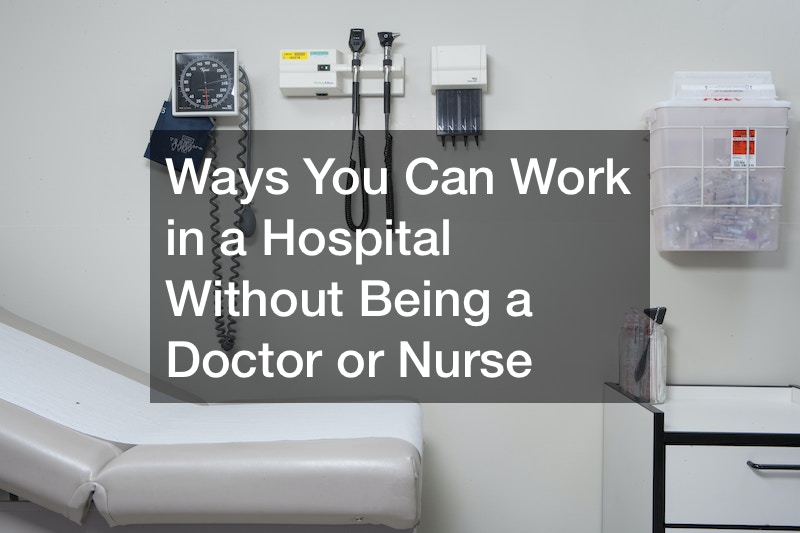

Are you looking for a job that provides you with a good salary and which also allows you to be of service to others? One field that can offer you many such jobs is the healthcare field.
You may think having a job in the healthcare field requires you to become a doctor or nurse. Although both professions have their allure, and there will always be a need for more of both professions, there are also many healthcare jobs that do not require you to be a doctor or nurse.
While many healthcare jobs take place in hospitals, not all of them do. With the increasing trend in providing localized treatments to healthcare clients, many small clinic jobs have emerged which will give you opportunities to help others while making a good salary.
Here is a list of some of the healthcare jobs that are not nurses or doctors:
1. Clerical Positions
Typing patient labels or filing medical records may not seem to be a way to directly help people, but without many types of clerical help, medical professionals would not be able to perform their clinical services. Some of the clerical positions required to efficiently run a healthcare facility include:
*Receptionist
*Medical Records Clerks
*Medical Library Assistants
*Admissions and Registration Clerks
*Insurance Referral Processing
*Information Technology Workers
*Radiology Library Clerks
*Appointment Clerks
*Coding Clerks
All of these clerical positions rarely require a college degree. However, many hospitals and clinics prefer their employees take a medical assistant course. These are easy to find and attend at local technical colleges and trade schools.
2. Walk-In Clinics
A personal physician is essential for everyone in order for your health status to be consistently monitored. However, there are times an unexpected health problem can occur. When this happens, clients need a place to go for non-emergent health problems. There are many small clinic jobs available at local ‘ walk in clinics‘. These jobs usually require taking a medical assistant course.
Medical assistants at these clinics take patients’ vital signs, check their blood sugar or assist the doctor with procedures. Other jobs may be available for phlebotomists (workers who draw blood), radiologists (workers who take X-rays), or EKG technicians. Training and certification for those jobs are available at local technical training schools.
3. Mental Health Clinics

Mental Health clinics help people with various mental health problems. Some facilities specialize in anxiety therapy treatment, and in helping clients with depression. Clients with mental health problems need helpers who are very understanding and supportive. You’ll need a bachelor’s degree in psychology or social work to work in a mental health clinic.
As a counselor for clients with mental health, you will do a lot of listening. You will need to help them feel safe and supported; so they can openly talk about the issues which are troubling them. You will use therapeutic methods to help them talk through their issues and help them find new ways to handle their problems Some mental health clinics have doctors on staff who prescribe medication to help with mental health problems.
4. Weight Loss Facilities
Many organizations are dedicated to helping people who need to lose weight. While some weight loss companies center their efforts on changing food patterns and offering group support, some small clinic jobs can be found at an office that offers physician-guided weight loss. To work in a physician guided weight loss center, you’ll need a bachelor’s degree in nutrition. Most states impose specific course requirements, and they also require you to pass a certification test.
During each client’s appointment, you will weigh the client. You will review the clients’ history with food and their current dietary habits. You will also discuss other methods they have tried to lose weight. These clinics will have doctors on staff who prescribe medication. Those medications are intended to help patients lose weight. Once the patient begins taking these medications, your ongoing job would be to assist the doctor to monitor the client’s physical and mental health as they lose weight.
When people lose a great deal of weight, the changes they go through include more than just physical changes. In order for them to permanently adopt new ways of eating, and accepting the changes in their bodies, you will need to offer them a great deal of support.
5. Addiction Rehab Counselors

Addiction counselors are another of the many small clinic jobs. Clients with addictions are often able to stop their addictive habits by participating in a 12-step group. However, many need more intensive help to overcome their addictions and to regain a healthy life.
For a job as an addiction counselor, you not only need a bachelor’s degree in psychology or social work; but most addiction clinics require their counselors to have successfully overcome addictions of their own. This gives those counselors a unique perspective when providing support to the addicts who seek help.
6. Physical Therapy Assistant
Victims of strokes, surgical patients, or auto crash victims often need the assistance of physical therapists to regain their ability to walk and take care of themselves. Physical therapy assistants assist those clients to carry out the therapists’ orders. Physical therapy assistants become qualified by taking programs provided by many universities or trade schools.
One specific place to find small clinic jobs for physical therapy assistants is in settings that provide TMJ treatments. This condition involves stiffness or abnormal movements of the jaw and can interfere with chewing and with speech. Physical therapy assistants remind clients of their prescribed exercises and assist them as they perform them
7. Clinics for Treatment-Resistant Depression

Clients with depression often find help and relief at mental health clinics. However, some small clinic jobs involve working with clients whose depression doesn’t respond to conventional medication or therapy. An increasing number of people have found relief from their depression by using ketamine infusion therapy.
Ketamine is a medication conventionally used in anesthesia, but which has also shown success in relieving severe depression. As an assistant to the doctors in these clinics, you will help patients to sit comfortably, and then you will monitor the patients while their infusions are running. You will continue to ensure the clients’ comfort, during their treatments by giving them a blanket or adjusting the light level.
After the ketamine injection, you will guide the clients to relax in the recovery area, and you will provide them with water. You will then monitor their condition until they are ready to go home. Training for this job could be minimal but may often involve the completion of a medical assistant course.
8. Plastic surgery clinics
The next of these small clinic jobs is to assist one of your area’s local plastic surgeons. Plastic surgeons provide a wide range of treatments. Some plastic surgeons may specialize in one or two specific treatments, and these clinics need assistants.
With the same level of medical assistant training, and by performing similar tasks to monitor the surgeons’ clients as they recover from their procedures, you can perform a needed service in these facilities.
9. End-of-Life Planning Counselors

Most small clinic jobs don’t concentrate on end-of-life planning. However, small clinics that have elderly or seriously ill clients may need to eventually assist those clients who have terminal illnesses.
It’s important for clinics to be aware of businesses in their communities that can assist their clients who want advice about pre planning funerals .
If you complete a bachelor’s degree with a major in social work, or in psychology, you may be able to provide counseling services while clients visit your clinic. If your clinic doesn’t offer such services, your employer should develop business relationships with local hospices, bereavement societies and funeral companies.
10. Polysomnography Technologists
Polysomnography is a procedure that provides a study of sleep disorders. As a polysomnography technologist, you will prepare clients for their sleep studies by placing sensors on their heads and on various parts of their bodies to detect their movements during sleep. You will then sit in another room while the client sleeps and monitor those movements.
A machine will track the client’s movements, along with the client’s oxygen level. If the client has an emergency during the procedure, you must know how to respond – and, if necessary, send the client to the emergency room. To prepare to work as a polysomnographer, you must take a course at an accredited program or complete a STAR (Sleep Technology Approved Resource) program.
11. Laboratory Assistants
Laboratory assistants receive specimens taken from patients and perform the tests ordered by the patient’s doctor. As a laboratory assistant, you must know how to safely handle the body fluids provided for specimens. You must also know how to operate the many machines and testing methods used for lab tests.
To prepare to be a laboratory assistant, you need to complete a bachelor’s degree in medical technology or life science. Working in a laboratory does not normally involve patient contact, but it is an essential part of the patient’s overall healthcare.
12. Biomedical Engineers
As the use of technology increases in healthcare facilities, a new field has emerged to supply workers who can maintain and repair the many technological devices that monitor or test patients’ conditions. A biomedical engineer may fix broken equipment or examine the equipment while it is in use.
This is a field that requires attention to detail and the ability to understand the workings of the various types of biomedical equipment. To become a biomedical engineer, you will need to obtain a bachelor’s or graduate degree in bioengineering, or in biomedical engineering.
13. Hazardous Waste Disposal Services
A very important result of providing medical services is to ensure any medical waste products created during the procedures involving the patients are properly and safely destroyed. While these small clinic jobs are not glamorous, and have little client contact, the importance of medical hazardous waste disposal service is paramount.
Proper methods of disposal will ensure infection containment. Jobs for people who can facilitate these practices will always be in demand. These jobs don’t usually require a worker to undergo a formal training program. Workers with experience as custodians -especially those in clinics – can usually be quickly trained to learn and perform the duties of these jobs.
14. Environmental Waste Disposal
With similar tasks and focus; as well as requiring similar training and background, workers willing to perform the duties required to maintain a clean environment will be needed to allow people to live in healthy communities. The need for workers to assist with environmental waste disposal is highly likely to increase as time goes on.
15. Pharmaceutical Waste Management
Whether during the preparation phase of creating pills or other medical doses; or during their packing and distribution, the need for workers who can facilitate pharmaceutical waste management is a very important one. When patients pass away or stop using medications, the methods of disposal for unused medication are important. Some states have laws regarding medication disposal- especially for the disposal of narcotics or chemotherapy drugs. If you’ve completed a pharmacy technician program or have been properly trained by a pharmacist or other professional, you will be able to assist with the proper disposal of pharmaceutical waste.
If you do an internet search, you’ll easily discover that there are many other healthcare jobs available that don’t require you to be a nurse or doctor. Many of these jobs require a course of preparatory study, but others need only on-the-job training. The diversity of needs of healthcare clients means the number of jobs available is limited only by the community’s collective imagination.



